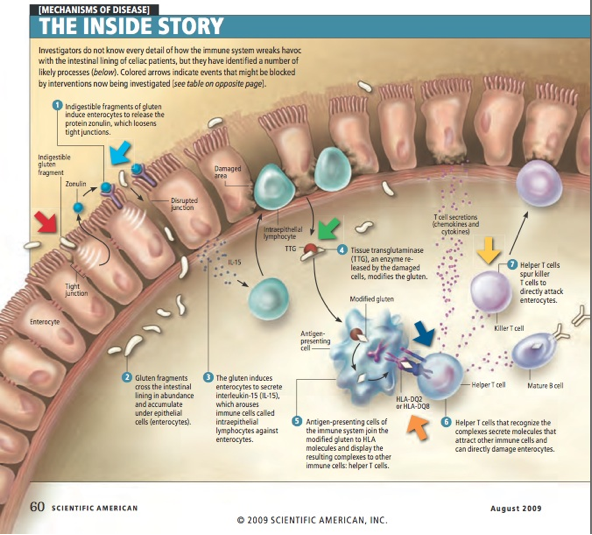Over the past 15 years, a growing body of published research supports the hypothesis that the protein zonulin is a key modulator of the tight junctions between enterocytes in the intestines.
Here is a brief overview of Zonulin From Wikipedia:
Zonulin is a protein that modulates the permeability of tight junctions between cells of the wall of the digestive tract. It was discovered in 2000 by Alessio Fasano and his team at the University of Maryland School of Medicine. As the mammalian analog of zonula occludens toxin, secreted by cholera pathogen Vibrio cholerae, zonulin has been implicated in the pathogenesis of celiac disease and diabetes mellitus type 1. Type 2 diabetic patients have shown increased zonulin.
Zonulin Is the “Doorway” to Leaky Gut
“The amazing discovery of zonulin a few years ago revolutionized our ability to understand the gut and permeability and how this impacts a wide range of health conditions from cancer to autoimmune disease to inflammation and food sensitivities,” says Dr. Jill Carnahan, MD (IFM certified in Functional Medicine).
Zonulin opens up tight junctions in the intestinal wall — this is normal and necessary for nutrients and other molecules to get in and out of the intestines. But when someone has leaky gut syndrome, those tight junctions between cells open up too much, allowing macromolecules to enter the bloodstream where an immunologic reaction can take place. Once that happens, the body is primed to react to those proteins every time they appear.
It can also cause leakage of intestinal contents — including bacteria into the immune system — that creates inflammation and overloads the liver’s ability to filter out toxins and other garbage.
Triggers That Open the Zonulin Doorway
Based on Dr. Fasano’s research, gluten and gut bacteria in the small intestine are the two most powerful triggers for “opening” the zonulin door.
As the zonulin level rises, the seal between the intestinal cells (tight junctions) diminishes, opening up spaces between the enterocytes that allow all sorts of things to pass right through — aka leaky gut.
The immune system can mistake these macromolecules as foreign invaders and mount an immune response, eventually leading to food sensitivities. In addition, this immune activation can further damage enterocytes, leaving the gut more inflamed and permeable, or “leaky.” As this continues, the microvilli, which line the intestines and absorb nutrients, also become damaged, increasing the risk of nutrient deficiencies.
Top causes of increased zonulin and development of leaky gut:
- Overgrowth of harmful organisms, like bacteria or yeast in the intestine
- SIBO (small intestinal bacterial overgrowth)
- Fungal dysbiosis or candida overgrowth
- Parasite infections
- Gliadin in the diet (from gluten-containing foods)
Gliadin, a glycoprotein present in gluten, causes zonulin levels to increase both in people who have celiac disease and those who do not. Interestingly, a study published in the Scandinavian Journal of Gastroenterology showed that gliadin can affect zonulin even in people without the gene for celiac disease.
Essentially, gluten affects intestinal permeability in everyone to different extents. It is reasonable to conclude that 100% of patients with autoimmune disease or leaky gut could potentially benefit from a gluten-free diet.
Elevated zonulin levels and leaky gut are also associated with the following:
- Crohn’s disease
- Type 1 diabetes
- Multiple sclerosis
- Asthma
- Glioma
- Inflammatory bowel disease
Genetic predisposition, miscommunication between innate and adaptive immunity, exposure to environmental triggers, and loss of intestinal barrier function secondary to the activation of the zonulin pathway by food-derived environmental triggers or changes in gut microbiota all seem to be key ingredients involved in the pathogenesis of inflammation, autoimmunity, and cancer.
This new theory implies that, once this path is activated, it can be reversed by preventing the continuous interplay between genes and the environment.
Upregulated zonulin levels can be present even after individuals have adopted a gluten-free diet. This is true for both celiac patients and those with other types of autoimmune diseases such as Crohn’s disease.
“We have seen this in celiac disease and type 1 diabetes and multiple sclerosis. When we discovered what zonulin is all about in terms of genes, now we know that zonulin is the precursor of a molecule, a protein called haptoglobin 2, so we know what kind of molecule it is,” says Dr. Alessio Fasano. “Using that as a biomarker, we see that there are three major categories of conditions that see zonulin upregulated or present in a mutated fashion.”
According to Fasano, this has also been proven in ovarian cancer, pancreatic cancer, glioma, and diseases of the nervous system, including schizophrenia and autism.
The significance of zonulin and its impact on not only leaky gut but also a variety of other potentially significant health issues cannot be underestimated — this reinforces the importance of reviewing the impact that grains in our modern diet have on our overall health.
Related Content:
In this on demand class, James LaValle, RPh, CCN, Infinite Allergy Labs Education Director, will discuss Food & Environmental Allergy Testing: Zonulin & Histamine.
Bio
Robert Lamberton, a Master Formulator of professional-grade supplements, works with select companies, clinics, and practitioners to develop cutting-edge formulations. He is a certified Functional Nutritional Therapy Practitioner (FNTP) who specializes in helping patients resolve complex health issues, optimizing their quality of life, and reversing their biological age. He has been a guest instructor and lecturer at Boucher Naturopathic Medical School (BINM) in Vancouver, BC. Lamberton also produces a weekly newsletter for practitioners that covers the latest published research, including information that has yet to reach the clinical community. Learn more at RobLamberton.com.
Copyright © 2023 R. V. Lamberton & Associates, All rights reserved.






